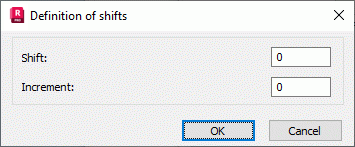Shift is applied in block subspace iteration in order to speed up the process convergence and to shift the convergence center to the selected spectrum part.
Consider the following shifted eigenproblem
Kσφ - λM φ = 0, (1)
where Kσ = K - σM, σ - shift value, λ, φ - eigenvalue and the eigenvector corresponding to it, M - mass matrix for dynamic problems and geometric stiffness matrix for buckling problems. If the shift value σ -> λi, i = 1, 2, ... , n, where λi - eigenvalue for mode i, n - number of modes to be determined, then the subspace iteration method is characterized by fast convergence for mode i. Thus, it may be concluded that a well-fitted shift value speeds up convergence of the eigenvalue whose value is close to the shift.
An initial shift value is entered to the Shift edit field. Increment parameter determines the number of iterations performed during modification of the shift. For example, if the increment is 5 and the convergence of an arbitrary eigenvalue is not obtained within 5 iterations, then the shift value will be changed in the manner shown by the following formula.
σ = λlastconv + 0.99 * (λlastconv - λfirstconv), (2)
where λlastconv, λfirstconv are the values of, respectively: the last eigenvalue for which convergence has been obtained and the first eigenvalue for which no convergence has been achieved.
Thus, there are three possibilities.
- If shift = 0 and increment ≥ 0, then the initial shift value equals zero
- If shift ≥ 0 and increment = 0, then the shift value is constant during all subspace iterations
- If shift = 0 and increment = 0, then the shift is not considered and Kσ = K.

Dynamic problems - remarks
You can use a variable shift value (when the increment value is greater than or equal to zero) to accelerate convergence. A shift value will be changing as shown by the equation (2). This method of calculations is recommended when convergence is slow. However, it should be remembered, that each change in a shift value causes repeated factorization of Kσ matrix; therefore, a shift value should not be modified too often.
Application of a constant shift value (when increment = 0) changes position of the convergence center to the value of the assumed shift σ.
Buckling problems - remarks
For buckling problems, only positive eigenvalues are taken into account. A positive value of the initial shift may accelerate convergence considerably. If a variable shift value is assumed (increment ≥ 0), then modification of a shift value takes place only when the updated shift value is greater.